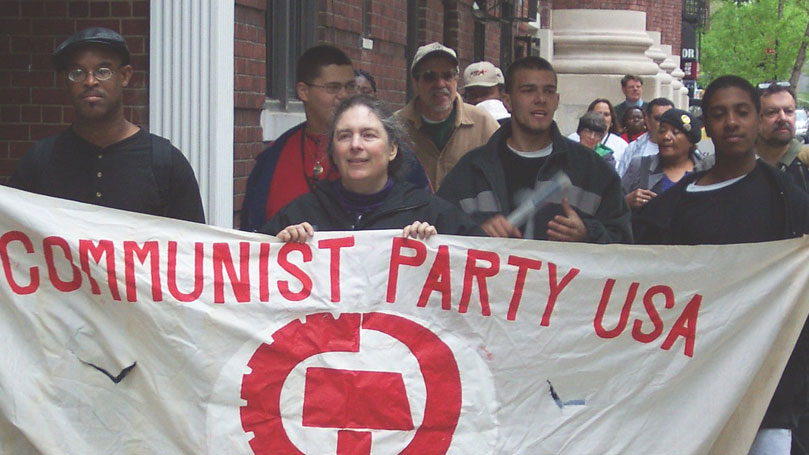
QDoes the CPUSA advocate the violent overthrow of the American government? Don't all Communists advocate violence?
ANo, we do not. We support the fullest expression of the democratic will of the majority, advocating extending democratic control over the economic decisions which affect our lives. We believe that it is possible to create and build a fundamentally new economic system using the provisions of the existing U.S. Constitution, using peaceful means, and winning a majority. We are for peace, for peaceful solutions to both international and intra-national problems, and for a peaceful transition to socialism, wherever possible. This has become ever more essential in the nuclear age.
Our Party Constitution states:
“Article VII: SECTION 2. Subject to the provisions of this Article, any member shall be expelled from the Party who is a strikebreaker, a provocateur, engaged in espionage, an informer, or who advocates force and violence or terrorism, or who participates in the activities of any group which acts to undermine or overthrow any democratic institutions through which the majority of the American people can express their right to determine their destiny.”
On the other hand, looking at the history of many revolutions, often the ruling class uses violence to try to overcome the will of the majority. In such cases, we do support the right of armed self-defense against attacks by the ruling class or its agents.
Many revolutions have been relatively peaceful, including the Russian Revolution of 1917 and the Vietnamese Revolution of 1945. The bloodshed comes when those formerly in power initiate a civil war, or foreign armies invade, trying to reestablish capitalist, feudal, or colonial power.
This was true in Russia, where there was not only a civil war, there was an invasion by 14 countries including the U.S. trying to topple the revolutionary government.
This was true in Vietnam, when the former colonial power (France) invaded Indochina in a vain attempt to re-establish their control of the people, resources, economics, and politics of the region following WWII. The responsibility for most of the violence rests on a deposed ruling class, in this case the French government (supported by the United States). After the Vietnamese defeated the French at Dien Bien Phu, there was a negotiated Geneva settlement, ending the military conflict, partitioning the country, and setting democratic elections for 1956. The United States was responsible for breaking that agreement, an international treaty with the supposed force of law. Eisenhower, U.S. President at the time, later explained that if the U.S. had allowed elections to be held, Ho Chi Minh would have won 80% of the vote. So the U.S. prevented democracy, supported an imposed and corrupt South Vietnamese government, and eventually invaded.
Our Party Constitution states:
“Article VII: SECTION 2. Subject to the provisions of this Article, any member shall be expelled from the Party who is a strikebreaker, a provocateur, engaged in espionage, an informer, or who advocates force and violence or terrorism, or who participates in the activities of any group which acts to undermine or overthrow any democratic institutions through which the majority of the American people can express their right to determine their destiny.”
On the other hand, looking at the history of many revolutions, often the ruling class uses violence to try to overcome the will of the majority. In such cases, we do support the right of armed self-defense against attacks by the ruling class or its agents.
Many revolutions have been relatively peaceful, including the Russian Revolution of 1917 and the Vietnamese Revolution of 1945. The bloodshed comes when those formerly in power initiate a civil war, or foreign armies invade, trying to reestablish capitalist, feudal, or colonial power.
This was true in Russia, where there was not only a civil war, there was an invasion by 14 countries including the U.S. trying to topple the revolutionary government.
This was true in Vietnam, when the former colonial power (France) invaded Indochina in a vain attempt to re-establish their control of the people, resources, economics, and politics of the region following WWII. The responsibility for most of the violence rests on a deposed ruling class, in this case the French government (supported by the United States). After the Vietnamese defeated the French at Dien Bien Phu, there was a negotiated Geneva settlement, ending the military conflict, partitioning the country, and setting democratic elections for 1956. The United States was responsible for breaking that agreement, an international treaty with the supposed force of law. Eisenhower, U.S. President at the time, later explained that if the U.S. had allowed elections to be held, Ho Chi Minh would have won 80% of the vote. So the U.S. prevented democracy, supported an imposed and corrupt South Vietnamese government, and eventually invaded.


 Join Now
Join Now